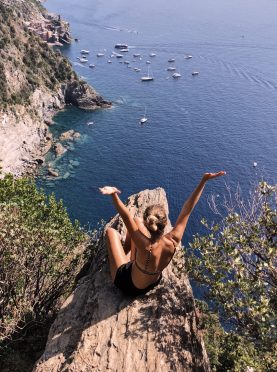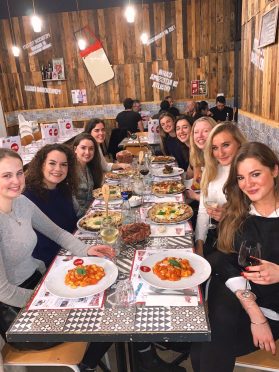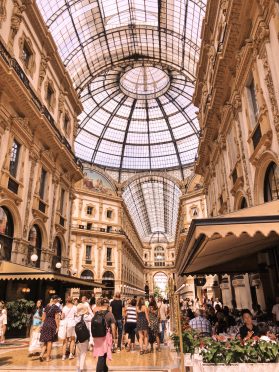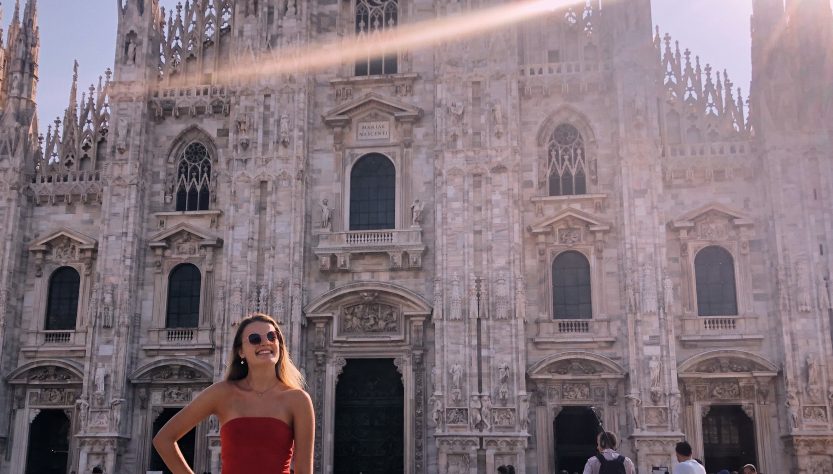Pre-departure:
An exchange semester is included in the BCom International Business degree and was an opportunity that I had been looking forward to. I chose Bocconi University in Milan as it is ranked as one of the best business universities in the world and offered specialised courses that I wouldn’t be able to take at Stellenbosch. The Italian lifestyle of good food and the centrality of Milan of course appealed to me as well.
and dates of the registration processes and residence applications. Accommodation in Milan is expensive – full stop. Whether you stay in a Bocconi residence or in private accommodation, you can expect most (if not all) of your budget to go into this. Spots in residences are extremely limited, first come first serve, and most exchange students get placed in Arcobaleno residence which is relatively far away from campus. I therefore opted for private accommodation and contacted an agency to help me find a more affordable apartment closer to campus to share with other students.
At first the preparations can seem like an overwhelming task, but the university helps you through it and by ticking off the boxes one by one everything will eventually get done.
Course selection also operates on a first come first serve basis. I therefore recommend making a list of all the courses you are considering beforehand and sitting by your computer and refreshing the course selection page continuously to ensure that you are able to enrol for all the courses you want to take as soon as course enrolment opens – spots fill up quickly!
I had to apply for a long stay Italian Visa. Apply for this well in advance and go through the Visa checklist extensively to ensure you have all the required documents before you go to the scheduled meeting. This will ensure for a smooth and stress-free application process.
Packing was another concern of mine – how do you fit everything you will need for six months into two suitcases? (Check the airline bag policy about the weight and number of suitcases can check in by the way – I almost got it very wrong). If you don’t have winter coats and clothing for the European winter yet, I recommend buying them in Milan. You can get winter coats for relatively the same price as in South Africa and it will save you a lot of space. I packed some old bed sheets and pillowcases from home as my accommodation in Milan didn’t provide any, this saved me some money. Pro-packing tip: pack your winter clothes and bedding in vacuum packs for more space.
Experience at Host University:
To be honest, my first day upon arrival in Milan was not quite smooth sailing. I couldn’t find a shop to buy an Italian sim card at – all of them were closed (it’s called Italian time I later learned), my suitcase’s wheel broke, I had to buy a tram ticket from a random man on the street to get to my apartment because the tram ticket shop was also closed (shocker), all of the labels in the grocery store was in Italian so I had no idea what I was purchasing, I didn’t know where to buy pillows and a duvet and whenever I asked for directions no one understood a word of English. Needless to say, when I arrived at my empty apartment that night, with no bedding, no sim and a grocery bag containing some questionable items – I came to the realisation that the next six months were not simply going to be a walk in the park and that this would be a period of serious personal growth. I felt very alone in the first few days, class hadn’t started yet, my flatmates hadn’t moved in yet and I didn’t quite know how to meet new people. It helped a lot to keep myself busy so in the first few days I explored the city. I quickly became familiar with the streets and the public transport system and Milan started feeling a bit more like home soon enough. I stepped out of my comfort zone to meet new people before class started and met up with other exchange students for aperitivo when they suggested it on an exchange WhatsApp group. I am so glad I did this, as the students I met that night became some of my best friends on this exchange.
Bocconi university will give you all the information you need to apply for your permit of stay during welcoming. The International Student Desk (ISD) also hosts optional welcoming activities like campus tours and outings to some museums and art galleries in Milan.
I didn’t attend the Italian language crash course as isn’t compulsory, but this could be a good way to meet students before class starts – it is, however, quite time consuming. I recommend learning a few basic Italian phrases if you won’t be attending the crash course as Italian is definitely the predominantly spoken language and many of the people I met couldn’t speak English at all. I definitely experienced more of a culture shock than I initially anticipated.
I joined the Erasmus Student Network (ESN). They hosted many activities and aperitivo’s for exchange students and arranged trips to Italian cities like Florence and Cinque Terre. It was also great for discounts on bus and plane tickets!

I found the level difficulty of the course content to be relatively similar to my home university, however I performed better academically at Bocconi than at Stellenbosch because of their assessment methods. I took International Project Finance, Business Strategy, Management of Fashion Companies, Management of public and non-profit organisations, and Principles of E-commerce and E-marketing. My favourite was definitely Business Strategy – there was no exam, but five group work case studies had to be submitted during the semester. Class participation accounted for 20% of your grade and you had to come to class prepared and ready to answer questions. The lecturer was incredible – he inspired us to think about business strategy in a different way, he explained content in a way everyone understood, and students were eager to answer his questions.
Life outside the classroom consisted of trying many Italian delicacies: pistachio brioches, cappuccinos, pasta, and pizza and way too much gelato. Aperitivo quickly became my new favourite word! Eating meals at restaurants can be a real budget breaker, but with aperitivo you definitely get bang for your buck as you pay for your drink and get to dive into an all you can eat buffet that’s included in the drink price. There are many cute affordable aperitivo places that students love to hang out along the Navigli canals.

I organised my class schedule to have Fridays free, allowing for a bit of a longer weekend which was ideal for traveling. Milan is very centrally located in Europe and traveling from here was relatively cheap and easy – especially with Flixbus and Ryanair. During my time in Europe I visited some beautiful Italian cities: Rome and Cinque Terre are definite must-see places. I also travelled to France, Switzerland, Netherlands, Spain, Germany, Czech Republic, Austria and Hungary.
Lecturers were very helpful in equipping students for exams and answering any questions that students had, exams were reasonable, and the exam process was slightly less formal than at Stellenbosch. All exams ended on the 21st of December to give students the opportunity to go home for Christmas. I however, decided to make the most of my stay in Europe and travelled some more after exams.
Return to Stellenbosch:
I left for Bocconi in August 2019 and returned to South Africa in January 2020. It definitely took a few days to get used to the South African heat. But to be honest I was so happy for some sun! When I arrived, I quickly realised that six months feel like a long time but also like almost no time at all. Nothing much changed back home and it soon almost felt like I had never left – except that after all of this I am a bit different in the sense that I have experienced so much growth, gained a much broader perspective of the world and the people in it, and learned that I can do much more than I give myself credit for.
I also learned to appreciate South Africa much more and be grateful for all that our country offers. There are just no people like South Africans, they are in general so much more friendly and open than Europeans. I was shocked when I walked into a shop in South Africa for the first time again and the staff were all warm and chatty, asking if they can help me and making conversation. South African weather is also in a class of its own and I will never again complain about our winters.
Something interesting I learnt is that South Africa is not that different to Italy in several areas. We might have African time, but Italian time is just as frustrating. Shops open much later and close during the day at the most random hours, the trams are seldom on time, very often they stop running or break down and many Italians don’t enjoy problem solving – rather throwing a “non-possible” your way than trying to help you. I also learnt that Italy has many bureaucratic issues and corruption just like us.
This exchange taught me some important life lessons too. Not only did I learn so much about different countries and cultures, but I also learnt some serious problem-solving skills, to speak up for myself, and to take charge of my own experience. I learned that it is okay to struggle with things and to be put out of your comfort zone.
If I can give one tip to future exchange students, it is to not compare your journey with anyone else’s – especially not the experience people show on social media. Everyone’s journey is different and that is the beauty of it. Move at your own pace, do what makes you happy and make the most of the opportunities given to you. Buckle up for six months out of your comfort zone, challenges, incredible experiences, beautiful people from all around the world, picturesque towns, and personal growth. It is all over in a blink of an eye and will leave you with a lifetime of memories.
To summarise: I recommend the exchange experience to every single person. This is an incredible opportunity that you will without a doubt walk away from so much richer.


